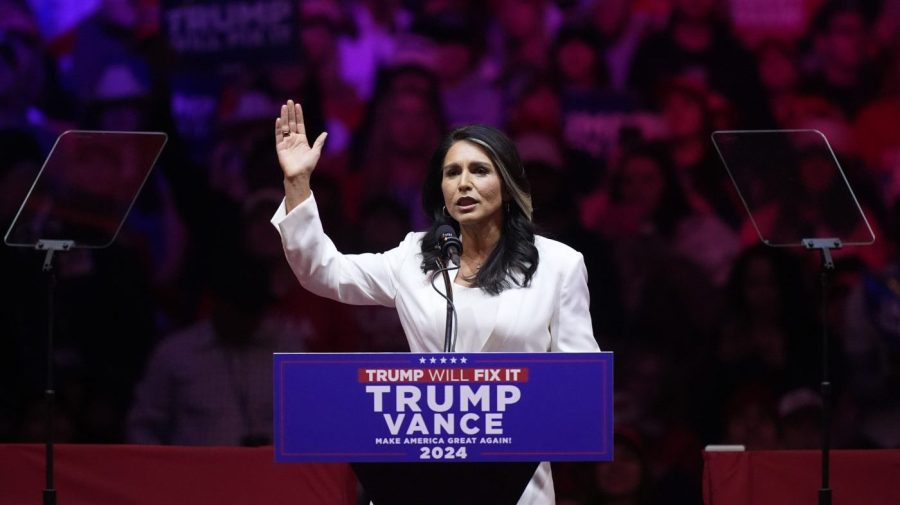
With the withdrawal of Rep. Matt Gaetz (R-Fla.) from consideration as attorney general, attention has shifted to President-elect Donald Trump’s other nominees for Cabinet-level positions — and to the criteria senators should use to assess their qualifications.
Before scheduling a vote on whether to appoint former Rep. Tulsi Gabbard as director of National Intelligence — overseeing and directing the huge budgets of 18 government intelligence agencies and advising the president on matters related to national security — senators should ask tough questions about her public positions on a range of foreign policy issues, especially her repetition of talking points of the Russian media and President Vladimir Putin.
Born in American Samoa and raised in Hawaii, Gabbard, an officer in the National Guard and the Army Reserves, was deployed to Iraq and Kuwait. She represented Hawaii as a Democrat in the House of Representatives from 2013-2020, the first Hindu ever to serve in Congress. Gabbard was a member of the Armed Services, Foreign Affairs and Homeland Security committees. A supporter of Bernie Sanders in 2016, she resigned from the House in 2020 and made an unsuccessful bid for the Democratic presidential nomination.
She left the Democratic Party in 2022, claiming it was “under the complete control of an elitist cabal of warmongers.” Gabbard endorsed Trump earlier this year and often accompanied him on the campaign trail.
Gabbard has no known expertise in evaluating the sources and methods of and assessments made by intelligence agency professionals. She has held no administrative roles in the federal government. While in Congress, she introduced “The Protect Whistleblowers Act” legislation and two other bills, to shield individuals like Daniel Ellsberg, Julian Assange and Edward Snowden from prosecution for leaking classified information to the media. Gabbard also supported repeal of laws that authorize U.S. intelligence agencies to surveil foreign adversaries. Her proposals got no traction in the House.
To date, the Trump transition team has not requested a FBI background check, previously required by the Senate, on Gabbard (or any other nominee) that might turn up unethical behavior or conflicts of interest.
That said, here are examples of Gabbard’s foreign policy positions that shed light on her qualifications to serve as director of National Intelligence.
In 2015, Gabbard opposed American airstrikes on the Islamic State terror group in Syria by the Obama administration because the Assad regime “does not pose a direct threat to the United States.” But she also said “Al-Qaeda attacked us on 9/11 and must be defeated. Obama won’t bomb them in Syria. Putin did.” In 2017, Gabbard met secretly with Syrian dictator Bashar al-Assad, who had welcomed military intervention by Russia to crush an initially nonviolent popular uprising to depose him that had become a deadly civil war. She has questioned evidence that Assad used chemical weapons on his own people.
Gabbard opposed sanctions on Iran and the designation of that country’s military officers as terrorists. In 2020, she declared that the drone strike by the Trump administration that killed Qassem Soleimani, leader of the Islamic Revolutionary Guard, violated the Constitution.
Because NATO members considered including Ukraine in the alliance, Gabbard deemed them responsible for Russia’s invasion in 2022. She defended Russia’s “legitimate security concerns,” staunchly opposed sanctions and criticized the Biden administration for “waging this modern-day siege against Russia, isolating, containing, destroying their economy, and starving the Russian people,” to get them to overthrow Putin.
This year, she alleged that Vice President Kamala Harris was the “main instigator” of the war between Russia and Ukraine. Gabbard has repeated false claims in the Russian media that the U.S. is funding biological weapons labs in Ukraine to facilitate release of deadly pathogens. She spread false claims that America collaborated with Ukraine to destroy the Nord Stream gas pipeline linking Russia and Germany.
In 2021, the largest contributor to Gabbard’s political action committee was a Putin apologist who believes the Russian president “continues efforts to create venues to bring peoples and countries together despite vilifications.” In 2022, a Russian talk show host called Gabbard “our girlfriend.” In an adulatory profile, Komsomolskaya Pravda, a Kremlin-approved newspaper, noted positively that Gabbard is considered “an agent of the Russian state,” and a state-controlled TV station referred to her as “comrade.”
In 2022, Sen. Mitt Romney (R-Utah) complained on social media that Gabbard “is parroting false Russian propaganda. Her treasonous lies may well cost lives.” A week or so ago, Nikki Haley, U.N. ambassador in the first Trump administration, slammed Gabbard as a “Russian, Iranian, Chinese sympathizer.”
Last month, Sen. Lindsay Graham (R-S.C.) advised his Republican and Democratic colleagues to defer, as he says he has, “to presidential Cabinet choices unless the evidence suggests disqualification.” To be sure, Graham — who voted against four of Biden’s Cabinet choices and Supreme Court nominee Ketanji Brown Jackson, and declared Gaetz to be “very bright” and “qualified” to be attorney general — does not always practice what he preaches.
Nonetheless, senators who take seriously their constitutional duty to advise and consent on presidential appointments should be willing to muster the courage to reject a nominee when “the evidence suggests disqualification,” as it apparently does with Tulsi Gabbard.
Glenn C. Altschuler is the Thomas and Dorothy Litwin Professor of American Studies at Cornell University.

